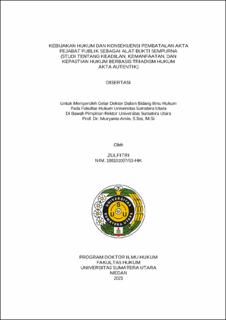Kebijakan Hukum Dan Konsekuensi Pembatalan Akta Pejabat Publik Sebagai Alat Bukti Sempurna (Studi Tentang Keadilan, Kemanfaatan, Dan Kepastian Hukum Berbasis Triadism Hukum Akta Autentik)
Juridical Policy and The Consequence of Revoking Public Official’s Deed as Perfect Evidence (A Study in Justice, Usefulness, and Legal Triadism Based-Legal Certainty of Authentic Deeds)

Date
2025Author
Zulfitri, Zulfitri
Advisor(s)
Runtung
Kamello, Tan
Yamin, Muhammad
Metadata
Show full item recordAbstract
Revoking a deed which is based on the court verdict will cause legal consequence on the persons appearing and the Notary who makes the deeds. In the case like this, the Notary can be convicted (found guilty) because there is a legal offense even though the Notary only embodies what has been said by the persons appearing who make the contract in the deed (constantir). It means that in the frame of legal protection, a Notary cannot actually be blamed or convicted since he is only the person who makes the deed according to his job. The real information is actually found in the hands of the parties appearing who make the contract.
The objective of the research is to explore and analyzed the legal criteria of an authentic notarial deed which can be revoked by the court’s decision, to criticize and analyze the regulation on the implementation of the consequence of revolking a public officials authentic deed through the court’s verdict which is final and conclusive, and to understand and analyze the implementation of a legal concept in providing protection and justice for the parties on the revocation of public official’s authentic deed, based on the Supreme Court Decision No. 3703.K/PDT/2016. This research method uses the post-positivism paradigm with critical realism ontology, a normative juridical approach method, strengthened by a qualitative method as data analysis with a descriptive analytical research method. In the theoretical basis of this dissertation uses the theory of position and notarial position, the theory of responsibility, and the theory of legal protection.
The result of the research suggests that in revoking an authentic deed, there is a conflict in the value of justice, usefulness, and legal certainty : Article 66 of UUJN (Notarial Act) and the Constitutional Court Ruling indicate that there is a tension between the rights of a Notary as a public official and the rights of the persons appearing who rely on the authentic deed as legal evidence. The research conclusion is that an authentic deed is a document which is made by or before an authentic official, in this case, a Notary and has a perfect legal. Evidence. Article 51 of UUJN states that the consequence of violating done by a Notary will cause the deed to be a probative value as an underhanded deed or it will be legally null and void, and it can be the reason for the aggrieved party to claim reimbursement, compensation, and interest to the Notary, and the Notary cannot be summoned in the process of inquiry and investigation or public prosecution. It is recommended that the government and the House of Representative do rule breaking of Law No.2/2014 to be adjusted to the related laws in order avoid disharmony or contradiction in the UUJN or related regulations, and the MKNW should be able to explore, criticize, and understand, or to learn and understand the related regulations. The should understand the regulations thoroughly, be able to give criticism, and know the legal solution in implementation the values of triadism law
Collections
- Doctoral Dissertations [173]
